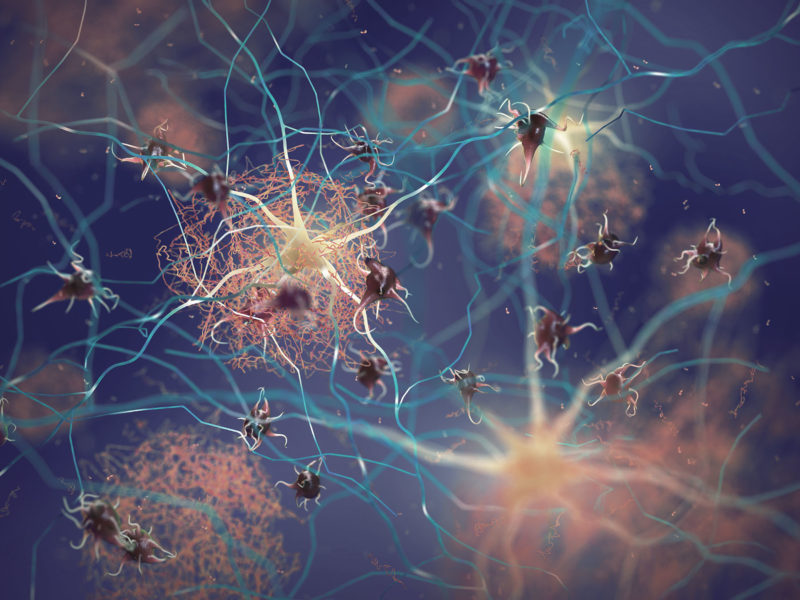There is now a significant body of research showing that poor metabolic health increases your risk for dementia or Alzheimer’s disease. The mechanisms connecting metabolic disorders and cognitive decline are not fully understood, but several solid theories exist. One that’s clear from recent population studies is that insulin resistance plays a role. Indeed, Alzheimer’s disease has been dubbed “Type 3 diabetes” because of its higher prevalence among people with insulin resistance and impaired insulin.
“Alzheimer’s disease has been dubbed “Type 3 diabetes” because of its higher prevalence among people with insulin resistance and impaired insulin.”
Learning more about this link is crucial. Around 6.2 million Americans aged 65 or older live with Alzheimer’s disease, and this figure is predicted to more than double by 2050. The health care costs associated with Alzheimer’s and other dementias in the US are expected to hit $355 billion in 2021. Add to that an estimated $250 billion worth of unpaid caregiving by patients’ families and friends. With 50 million people living with dementia worldwide and 10 million new cases expected each year, finding ways to prevent, treat, cure, or simply slow the devastating progression of dementia has become an urgent global challenge, particularly since medications for Alzheimer’s are largely not effective, and may even be harmful. Fortunately, recent research in the top medical journal The Lancet shows that 40% of Alzheimer’s cases are related to 12 modifiable risk factors (and therefore are likely preventable) and that we should be “ambitious about prevention” with Alzheimer’s.
Here is a look at how metabolic health affects the brain and the likely mechanisms behind these kinds of cognitive decline.
Insulin and the Brain
The brain is a disproportionately glucose-hungry organ, consuming around a fifth of the body’s glucose-derived energy despite representing around a fiftieth of its weight. When glucose is in short supply, such as during fasting, brain cells can generate energy from ketones. These are molecules generated by the liver when it breaks down fats.
Research suggests that insulin plays a crucial role in many important processes in the brain, from controlling the production of glucose in the liver to regulating appetite, reproduction, memory, and mood. It also plays a key role in generating and protecting neurons, the brain cells that relay information between different parts of the brain and around the body.
Like other kinds of cells in the body, brain cells can become insulin resistant, meaning their insulin receptors—proteins on the cell surface—no longer respond to insulin as efficiently. This can lead to numerous health issues. Insulin resistance has been detected in the brains of people with Type 2 diabetes and Alzheimer’s. It has also been noted in the hippocampus—the brain’s memory and learning center—in rodents with Alzheimer’s. Until a few years ago, scientists believed that the decrease in the brain’s overall energy demand was a consequence rather than a cause of Alzheimer’s: as brain cells died off, the brain needed less energy. But several studies on glucose uptake in the brains of people genetically at risk of Alzheimer’s found that brain glucose metabolism drops decades before cognitive symptoms appear.
However, the broad range of metabolic disorders, most of which stem from insulin resistance, could also drive the different stages of cognitive decline through mechanisms beyond the brain.
Related article: Research reveals more links between metabolic health and dementia
Different Types of Cognitive Decline
Everyone’s thinking abilities subtly decline as we age, but more noticeable cognitive impairments can also be brought on by chronic disease, repeated strokes, infections, and metabolic health issues, including diabetes.
Mild cognitive impairment (MCI) is the stage between expected age-related decline and diagnosed dementia. A person with MCI may experience problems with memory, decision-making, and spatial perception while still living a healthy, independent life.
Dementia is the umbrella term for progressive cognitive and behavioral deterioration. Symptoms depend on the part of the brain affected and may include memory loss, difficulties with problem-solving and language, and changes in mood that become severe enough to affect daily life.
Dementia occurs when disease or injury damages the brain. Vascular dementia, for instance, arises from a lack of oxygen reaching the brain through the blood vessels, causing neurons to die.
Alzheimer’s disease—which accounts for around two-thirds of all dementia cases—is a degenerative condition characterized by complex brain changes and cell damage. The most common early symptom of Alzheimer’s is difficulty remembering new information because the disease typically impacts the brain’s learning regions first. Symptoms gradually worsen until eventually speaking, walking, and even swallowing become difficult.
The Mind-Metabolism Connection: Epidemiological Evidence
Aging populations and the obesity epidemic have positioned Alzheimer’s and Type-2 diabetes among the most severe health scourges of the modern world, and the two may be linked. (To diagnose dementia, researchers use standardized tests to assess a range of cognitive functions, such as memory, information processing, and verbal fluency. For example, naming as many animals as possible in a minute.) Several population studies around the world have connected metabolic health to various stages of cognitive decline.
A study that looked at 2,252 adults aged 60 or older living in the US found that metabolic syndrome—defined as a combination of three or more symptoms, such as hyperglycemia, high blood pressure, or abdominal obesity—may hamper visual-spatial skills, attention, and motor processing speed. Participants with more features of metabolic syndrome performed worse on the test than others, with the most detrimental features being high blood glucose and blood pressure. In a study of 1,759 postmenopausal women in Denmark, high blood glucose levels and insulin resistance diminished verbal fluency, concentration, and memory. In Finland, a study that followed 3,695 adults aged 30-86 for more than a decade found that those with insulin resistance experienced the steepest declines in verbal fluency. Health records of 80,000 South Koreans aged over 60 revealed an 11 times higher chance of Alzheimer’s among people with metabolic syndrome.
Since insulin is so important in the brain, and severe insulin resistance underlies Type-2 diabetes, it follows that brain health worsens as diabetes sets in. Using data from more than 6,000 older adults who were part of the oft-cited Rotterdam cohort, one study found that diabetes almost doubles the risk of dementia. And a growing body of research suggests that diabetes significantly raises the risk of Alzheimer’s and more than doubles the risk of vascular dementia. A UK study of nearly 450,000 people aged between 40 and 69 looked at the relationship between blood glucose levels and the incidence of cognitive decline and dementia. People with prediabetic levels had 1.5 times the risk of vascular dementia compared to those whose blood sugar was in the normal range, and the risk was almost three times as much among those diagnosed with diabetes.
This result was backed up by a Spanish study that tested skills including verbal fluency and short-term memory in more than 1,800 adults with Type-2 diabetes and found that cognitive performance was better among patients who kept their blood glucose below a certain threshold. Evidence from Sweden has shown that dementia is diagnosed earlier in people with Type-2 diabetes, suggesting that young people with diabetes should be screened regularly to enable interventions that might delay cognitive decline.
Beyond insulin resistance and diabetes, there is increasing interest in the effects of diet on the brain. The takeaway from numerous observational studies published in recent decades is that healthy diets are associated with reduced cognitive decline and a lowered risk of dementia. According to brain scans of 255 Australians in their early 60s, people who reported eating a diet high in processed meats, fries, potato chips, and sugary drinks had a smaller left hippocampus (a brain region where memories are made and consolidated) in comparison to those who ate more fresh vegetables, salad, fruit, and grilled fish.
The Metabolic Mechanisms Behind Cognitive Decline
In recent decades, Alzheimer’s research has been dominated by the amyloid beta theory, which suggests that the abnormal accumulation of proteins triggers neurodegeneration into clumps in and around brain cells. However, recent research has found that some people who develop these amyloid plaques retain normal cognitive function. Amyloid beta remains a key target for treatment, but it seems the plaques cannot fully explain Alzheimer’s disease.
Researchers are now turning their focus towards the bioenergetic theory. There is mounting evidence that energy deficits in neuronal mitochondria—the cellular powerhouses that turn nutrients into energy—resulting from dysregulated glucose metabolism in the brain—may help drive the development of dementia. While the debate continues over whether insulin resistance is a cause or consequence of Alzheimer’s, it certainly seems to play a pivotal role. Here are some emerging theories about how and why insulin resistance—and poor metabolic health in general—affects brain function.
The Brain Needs Insulin
Insulin is involved in myriad functions in the brain. Insulin receptors have been identified in regions that regulate food intake, body weight, and cognitive processes, including attention, self-control, and memory. Functioning insulin receptors are crucial for a functioning brain and body; insulin resistance in the brain has been repeatedly identified as the common denominator between metabolic disorders and dementia. Even the primary genetic risk factor for late-onset Alzheimer’s—the APOE4 gene—interferes with insulin receptors’ ability to bind to insulin. Animal models indicate that insulin resistance in the hippocampus is involved in the cognitive decline seen in Alzheimer’s and Type-2 diabetes. In humans, we can detect changes in brain metabolism with medical imaging techniques that use a fluorescent chemical tracer that cells respond to like glucose. This has enabled researchers to detect impaired brain metabolism long before a dementia diagnosis.
There is no definitive list of the many roles of insulin in the brain, but those relating to neuron growth and protection are especially critical in the context of cognitive decline. For example, both types of diabetes impaired new brain cell growth in rodents, and this was linked to poorer memory. And in its defensive capacity, insulin helps activate a neuroprotective protein that prevents toxins from crossing the blood-brain barrier.
Energy Deprivation and Its Damaging Effects
Damage to brain cell mitochondria accumulates naturally with aging. Still, it is also thought that chronically compromised glucose uptake caused by insulin resistance could eventually starve the mitochondria of the energy they need to function. This state of hypometabolism harms brain cells and, at the same time, limits the generation and renewal of neurons. There is increasing evidence that glucose hypometabolism in the brain is a potential cause of Alzheimer’s disease and can be detected years before symptoms emerge. Drug and dietary interventions that improve glucose metabolism could help support healthy aging. An alternative energy source may be ketones, as several studies suggest that Alzheimer’s does not alter their brain uptake.
Another serious effect of energy starvation, and one of the hallmarks of Alzheimer’s disease, is brain atrophy, whereby cells die off, and the brain begins to shrink. Both insulin resistance and Type-2 diabetes have been linked to structural changes in the brain, as observed using MRI scans. Atrophy was particularly prominent in the temporal and frontal lobes—essential areas for memory, language, and emotions—of people with Type-2 diabetes and older adults with obesity and elevated blood insulin.
Insulin Protects Our Nerves
Normal insulin activity in the brain prevents the buildup of tau, a protein involved in the structure of neurons and transporting nutrients from one part of the cell to another. If tau is left to run wild, it can accumulate and cause nerves to twist and tangle. These tangles are often associated with Alzheimer’s alongside amyloid plaques. Insulin resistance has been linked to tau accumulation in cognitively normal adults, possibly because the brain is less able to use insulin to keep tau in check. More long-term observations will help researchers establish whether this develops into dementia.
Insulin Receptors Clear Away Amyloid Plaques
Whether insulin resistance triggers the growth of amyloid-beta plaques or vice versa remains unclear, and numerous studies appear to land on opposite sides of what may simply be a vicious circle. While some report that amyloid is toxic to insulin receptors, others have found that faulty insulin receptors enable the chain of cellular events that lead to amyloid buildup. In the lab, insulin has been seen to clear amyloid from brain cells.
Free-roaming Fats, Oxidative Stress, Inflammation, and the Effects of AGEs
Several common symptoms of metabolic disorders, which often exacerbate each other, could also accelerate cognitive decline.
- Dyslipidemia
Dyslipidemia is an imbalance in the various fats found roaming in the blood. Triglycerides become particularly elevated in metabolic syndrome and have been associated with cognitive impairment. In mice, these fats crossed the blood-brain barrier and triggered leptin and insulin resistance, which increased appetite and reduced cognition. Lowering their blood triglycerides reversed these effects, presenting a potential path to alleviate cognitive impairment and improve weight loss in people with obesity. - Oxidative Stress
Free radicals are highly reactive oxygen molecules essential to specific bodily processes such as wound healing but can become harmful once they outnumber the antioxidants that usually keep them in check. They can be generated by malfunctioning mitochondria in the setting of chronic hyperglycemia. Even ingesting a lot of sugar can increase free radical production within hours. The overproduction of free radicals leads to low cellular oxygen levels (hypoxia). The resulting state of oxidative stress is particularly harmful to the brain, which needs oxygen to function. Hypoxia could also disrupt the metabolism of a group of protective brain cells called microglia, preventing them from clearing up amyloid plaques. Unfortunately, oxidative stress can be a self-perpetuating process, as damaged cells generate more free radicals. On top of this, oxidative stress can also cause inflammation in the brain. - Inflammation
Metabolic disorders often feature varying degrees of inflammation. Usually, this is the body’s defense against disease or injury, but inflammation in metabolic disorders may be a response to overnutrition, hyperglycemia, and oxidative stress. In people with obesity, pro-inflammatory chemicals are released in abundance from fat tissues. As the body becomes resistant to the anti-inflammatory action of insulin, these chemicals start to build up in the blood. High levels of inflammation have been found to exacerbate cognitive decline among people with metabolic syndrome. Inflammation in the brain (neuroinflammation) could disrupt hippocampal insulin signaling, representing another potential link between Type-2 diabetes and Alzheimer’s. - Glycation
Poor glucose control leads to the build-up of advanced glycation end products (AGEs), in which excess sugar molecules bond to other molecules like proteins in the body. Indeed, elevated levels of AGE have been observed in people with diabetes. This is problematic as AGE accumulation can cause vascular problems, inflammation, and oxidative stress, which directly damage brain cells and lead to the production of more AGE, so they become part of a potentially unremitting cycle. AGEs have also long been associated with the formation of amyloid plaques in the brain, and a more recent study has found that glycated plaques are more toxic to the brain than regular plaques. - Poor Nutrition
Our diet may have a direct effect on our brain structure. The brain gets most of its energy from glucose after eating a good meal. This drops to less than 50% during fasting, and then ketones jump in to do the rest. Western eating habits create a constantly fed state—we eat regularly, and often highly processed, sugary foods—making the brain completely reliant on glucose. When the brain becomes insulin resistant, it can’t get enough glucose to meet its energy needs and starts to malfunction. Diets high in sugar and fat and low in nutrients could decrease the size of the brain’s long-term memory center. The microbiome may play a role here: Research published in spring 2021 suggested that changes to their gut bacteria caused brain atrophy and inflammation in mice on a high-sugar, high-fat diet.
Can we curb cognitive decline?
A cure for Alzheimer’s continues to elude scientists, but the links between metabolism and the brain hint at exciting possibilities for preventing and treating cognitive decline.
Anti-diabetic drugs and intranasal insulin
Using anti-diabetic drugs in an attempt to delay dementia by curbing insulin resistance has had mixed results. Some drugs show little to no effect on cognition, while others can induce hypoglycemia. But a combination of drug interventions could prove more significant than the sum of its parts in preventing further cognitive decline in people with early signs of Alzheimer’s. In December 2020, the diabetes drug semaglutide was approved for trial in people with early signs of Alzheimer’s, following safe and positive outcomes in 10 preclinical trials. One placebo-controlled study found semaglutide slowed the rate of dementia progression by half. We expect results in two years.
Artificially increasing insulin levels to boost the brain’s glucose intake is another option, but how to do so without inducing insulin resistance? One option is to shoot insulin up the nose, where the hormone can bypass the central bloodstream and reach the brain directly via tiny blood vessels in the nasal passage. A trial that included 100 people with MCI or Alzheimer’s found that taking intranasal insulin for four months improved participants’ ability to recall a story 20 minutes after first hearing it. Animal studies are helping reveal what mechanisms could be at work. In rats with Alzheimer’s, six weeks of intranasal insulin restored their ability to learn the way through a maze, and autopsies of their brains revealed that insulin reduces the accumulation of nerve-tangling tau.
Nutrition-based solutions
Our brains, like our bodies, are engines that need the right fuel to function. There is growing research on the connections between nutrition and neurodegeneration, on individual foods and dietary patterns, as well as specific nutrients. So far, most research has failed to find strong evidence between any specific food and AD prevention or reversal. There have been stronger associations in population studies between reduced AD and the consumption of antioxidants and polyunsaturated fats, but randomized trials have been less definitive. The best evidence has been in dietary approaches, with two holding the most promise:
- The Ketogenic Diet
If the energy deficits in the brain of people with Alzheimer’s are indeed specific to glucose, alternative fuels like ketones could help pick up the slack and protect the brain by enhancing energy reserves. Ketones are produced when the liver breaks down fat, and ketogenic diets are high in fat and protein and low in carbohydrates, which results in more fat burning for energy and thus more circulating ketones. Ketone metabolism is more efficient than glucose metabolism because it requires less oxygen, and studies in cultured cells hint that it may help reduce harmful free radicals. In mice with Alzheimer’s, extra dietary ketones conferred subtle improvements in learning and memory. In humans, the ketogenic diet holds promise for alleviating symptoms of MCI and improving daily activities like eating, bathing, and dressing in people with Alzheimer’s. Several clinical trials are underway to understand the keto diet’s full impact better. - The Mediterranean Diet
A diet rich in nuts, oils, fruits, vegetables, and fish but low in meat and sugars is typical in Mediterranean countries and could help maintain brain health by reducing inflammation and keeping bad cholesterol at bay. A more Mediterranean diet has been linked to reduced age-related brain atrophy, better memory, and reduced amyloid build-up among people with an increased risk of Alzheimer’s. Looking at more specific ingredients, a study of Spanish people in their 70’s showed that those instructed to eat a Mediterranean diet supplemented with nuts or olive oil, and therefore rich in antioxidants and micronutrients, experienced less cognitive decline than did a group advised to eat a low-fat diet.
Supporting the Microbiome
Research into the link between the microbiome and the brain suggests that gut microbes help manage mitochondrial metabolism required to fuel the brain and maintain cognitive function. Gut microbes may also influence brain insulin sensitivity and behavior by facilitating communications along the gut-brain axis. Gut microbes produce neurotransmitters—chemicals that carry messages to other cells via the nervous system—and metabolites, which travel through the blood and cross into the brain to be used as fuel.
Exercise
Exercise can stimulate brain cell growth and reduce inflammation and has had positive effects in numerous chronic diseases, including neurological disorders. Better physical fitness could help stave off age-related brain atrophy, while higher muscle mass could lower the risk of Alzheimer’s in old age. And the benefits aren’t just limited to the elderly. Regular running improved visual learning, memory, attention, and reaction speed in young, healthy adults.
Exercise is also known to increase levels of brain-derived neurotrophic factor (BDNF), a chemical that aids memory formation and learning but spurs the development of new brain cells and strengthens the connections between brain cells. There are multiple ways to stimulate BDNF production, but acute exercise seems to be the most effective.
With the many confounding risk factors of dementia, a system-wide approach may be the most effective, and lifestyles that combine a healthy diet, exercise, and learning could together help shore up robust cognition into old age, even in people carrying the APOE4 gene.
Conclusion
From the research presented here, it is clear that insulin resistance and the resulting complications—particularly the cardiovascular ones—can compromise the brain. Keeping glucose stable and insulin resistance at bay could keep the brain burning brighter for longer, enabling us to get the most out of later life.








